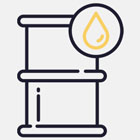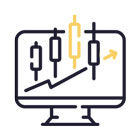Trading Instruments
Things You Need To Know About Trading Instruments Before You Invest
If you’re unsure what trading instruments are, we’re here to help. You might have heard traders talk about securities in the past. Well, those are trading instruments! In short, trading instruments are various types of markets that allow you to trade. That includes the stock market, the financial market, commodity futures, etc.
What Are Financial Trading Instruments?
But what are the most well-known financial trading instruments?

Currency Pairs (Forex Trading)
On the very top of the financial trading instruments list is definitely the foreign exchange market. It’s not only stable but also available all day, making trading within your reach whenever you want. It’s also the largest financial market in the world, with a daily volume of 5 trillion dollars. Forex includes trading currency pairs. Turning a profit on currency pairs means quoting two currencies against each other and betting on their exchange rate.

CFDs on Commodities

CFDs on Indices
CFDs on indices are contracts that traders make that speculate on the price change of a specific index. Traders can bet on the price going both up and down. Indices are collective stocks from a specific bundle of companies. That makes them safer for trading, given that the price of the index (that the trader is speculating about) isn’t dependant on one company but on a whole bundle of them. That technically means the trader can’t move with the market and alongside major companies.

Stock CFDs
Similar to CFDs on indices, stock CFDs allow traders to speculate on the price of the stocks without taking ownership of the underlying assets. However, with individual stocks, the traders tie their trades to one company and have to pay close attention to macro and micro factors that could potentially endanger it.

Cryptocurrency CFDs
Contract of difference is a popular form of crypto trading. Since cryptocurrencies are slowly but surely taking their rightful place in the financial market, it’s no wonder that traders are turning to them as an alternative for CFD trading.
Contract of difference is a popular form of crypto trading. Since cryptocurrencies are slowly but surely taking their rightful place in the financial market, it’s no wonder that traders are turning to them as an alternative for CFD trading.
Factor to Consider Before Investing
Liquidity
Liquidity of the financial instrument refers to how easy it is to quickly sell or buy assets on a particular market. Trading with a high liquidity instrument means that you can easily both sell and buy assets (even in large amounts) and still get a fair price.Volatility
Volatility indicates how fast the price changes. A volatile instrument is the one that is ideal for frequent traders who are looking to turn a profit more than once on a particular move.Transaction Costs
Since the whole point of trading is to make a profit, picking financial trading instruments with low transaction costs is wise. If you want to trade often or at high frequency, this is something you need to think about when picking an instrument.
Information Availability
The prices depend on a lot of things but most of all information. You need quick and easy access to data about economic and political changes, market movements, and other factors that might cause the price to go up or down. Not all financial instruments can provide the necessary levels of information availability.
Top 5 Trading Instruments

Forex
Forex practically has it all. It's a relatively stable market which isn't an easy feat. However, it's also a highly liquid market. Traders can enter it without any trouble and, since the volatility is also high, they can make frequent trades and turn a profit. Not to mention, Forex brokers will almost always offer a good leverage to traders.

Stock Indices
Stock Indices show us how the overall market is performing. Based on that, we can predict its movements and make our trades. The indices are an insight into specific companies' stock price. The index price is also weighted which makes comparisons and predictions easier.

Equities
Trading individual stocks or equities is different from the rest because the trader actually owns the underlying asset. Stocks are liquid and volatile which allows traders to make their moves on a daily basis.

Commodities
Trading commodities means trading for a profit. The commodities market is different because the prices are determined by the supply and demand. Based on them, traders can guess the price movement.

ETFs
ETFs or bonds track performance. However they focus on a specific sector (in both indices and commodities trading). These financial trading instruments come with a safety net, which makes them particularly appealing to traders (especially beginners).
Is There an Ideal Instrument to Trade?
There are no cure-all financial instruments out there. At the end of the day, it’s all about what you need and expects from trading. Of course, the financial instruments you go for also depend on the amount of capital you have. Trading with government bonds and with Forex requires different types of investments.
It’s also vital that you determine what type of trader you want to be. For example, if you’re more interested in day trading, you need instruments that don’t carry over the positions into the next day. What’s more, you also need those that are highly volatile and have low transaction costs. So, for example, it’s better to go for Forex instruments than for bond futures.









 Bitcoin
Bitcoin  Ethereum
Ethereum  Tether
Tether  XRP
XRP  USDC
USDC  Solana
Solana  TRON
TRON  JUSD
JUSD  Dogecoin
Dogecoin